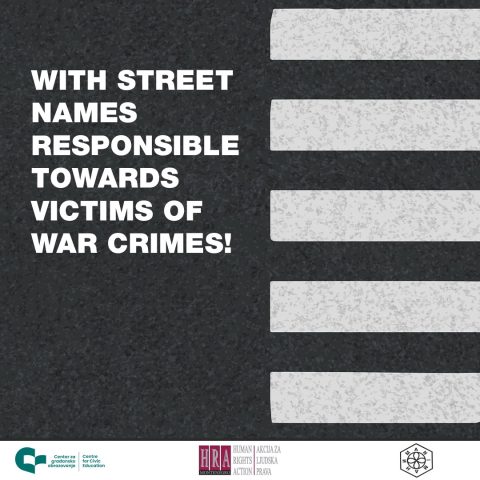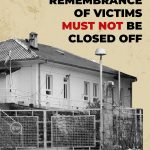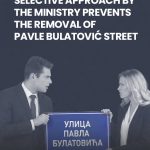
GOVERNMENT SHOWS DISRESPECT OF THE CONSTITUTIONAL COURT BY EXPRESS APPOINTMENT OF THE NEW AGENT BEFORE THE STRASBOURG COURT
02/02/2024
Protest to the Minister: The Head of Security of Minister should not be a Person Who Had Participated in Ill-Treatment and Its Concealment
20/02/2024WITH STREET NAMES RESPONSIBLE TOWARDS VICTIMS OF WAR CRIMES

Non-governmental organizations ANIMA Center for Women’s and Peace Education, Human Rights Action (HRA), and the Centre for Civic Education (CCE) express their protest against the proposal of councillors of Democrats, Mitar Vuković and Vladimir Čađenović, to name one of the streets in Podgorica after Pavle Bulatović, the Minister of Internal Affairs and Defense during the wars of the nineties.
Bulatović was the Minister of Internal Affairs in the government of Milo Đukanović and ordered the commission of the war crime of deporting Muslim refugees, i.e., people who sought refuge in Montenegro from war destruction, persecution, and death. According to his order, the Montenegrin police, without any legal basis, arrested at least 66 individuals (and according to some estimates, 100) and handed them over as hostages to the army of Republika Srpska.
Bulatović also served as the Minister of Internal Affairs of the Federal Republic of Yugoslavia (1992 – 1993) and as the Minister of Defense of the Federal Republic of Yugoslavia (1993 – 2000) during the rule of Slobodan Milošević. While holding his position of Minister of Defense, he was assassinated under still unresolved circumstances.
We emphasize that the Rules for determining proposals for the names of settlements, streets, and squares in the Capital city stipulate the obligation to “mark through the names of settlements, streets, and squares, the lasting values from the culture and tradition of the city, state, and surroundings.” Therefore, we express strong protest against the intention to (re)name a street in a manner that in any way justifies a committed crime. On these issues, and in such social conditions, it is necessary to insist on political consensus among those in power, the involvement of the academic community, and the broader public. In a situation where the process of transitional justice (without adequate convictions and lustration) has not been completed in the state and society, such methods of commemoration cause additional harm and contribute to divisions. We also do not understand what civilization values this naming would bring to our society, undoubtedly sending an extremely negative message in terms of affirming a selective approach to facing the past.
Furthermore, we point out that it is precisely the political structures that constitute the authorities in Podgorica that, during their political statements, rightfully questioned the wartime past of the DPS (Democratic Party of Socialists), and the role of former Prime Minister Đukanović in the wars of the 90s, so it remains unclear why there is a desire to honour one of the executors of those wartime policies in this way?!
Naming of settlements, squares, and streets is one of the mechanisms for building a culture of memory and society’s identity. Instead of celebrating the darkest period of modern history and encouraging divisions that destroy Montenegrin society in the 90s, we call on the councilors of the Assembly of the City of Podgorica to turn to bright examples of our past, personalities, and events that glorify humanity, culture, unity, tolerance, and the fight against extremism and violence.
ANIMA – Center for Women’s and Peace Education
Human Rights Action (HRA)
Centre for Civic Education (CCE)







 English
English